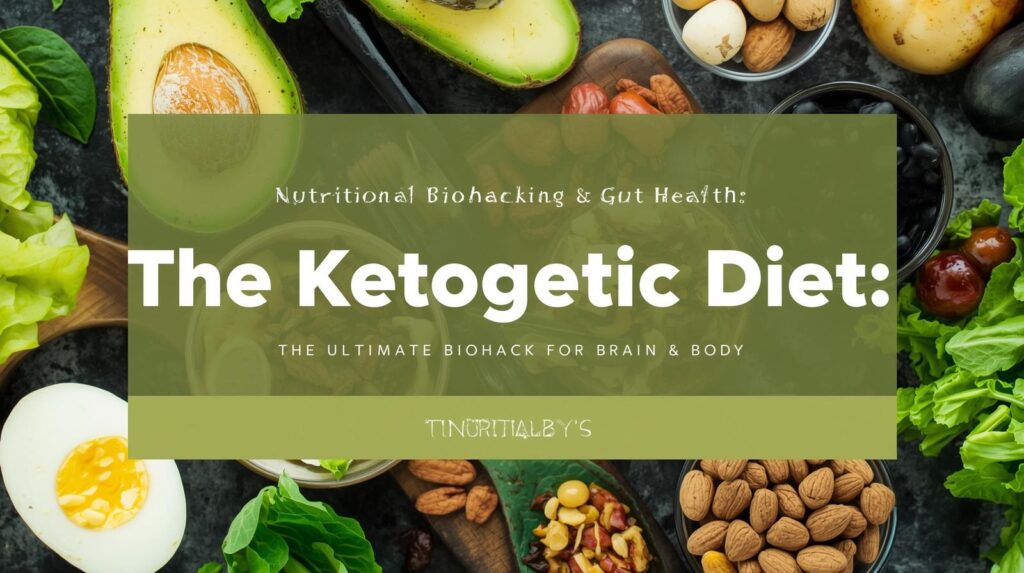In the wild world of biohacking, we’re all looking for that next edge—the thing that will sharpen our focus, boost our energy, and help us feel unstoppable. One of the biggest contenders in this arena is the ketogenic diet. You’ve probably heard of it, maybe even tried it. But keto is so much more than a weight-loss fad; it’s a full-blown metabolic strategy that can have a massive impact on your brain, your energy, and even your gut.
But is it the right move for you? As we explored in our guide to personalized nutrition, there’s no one-size-fits-all answer in health. So, let’s cut through the hype and get real about what the science says, what it feels like, and how you can decide if going keto is your next big biohack.
First Off, What Are We Actually Doing to Our Bodies on Keto?
Think of your body as a hybrid car. Most of the time, it runs on glucose (from carbs), which is like the standard gasoline. It’s quick, easy, and gets the job done. But what happens when you take the gas away? Your body, being the incredibly smart machine it is, switches over to its electric power: ketones.
This metabolic state, called ketosis, happens when you dramatically reduce your carb intake (usually to under 50 grams a day) and up your healthy fats. Your liver starts breaking down fat into these little super-fuel molecules called ketones. Your brain and body can then use these for energy, and this is where the magic begins.
This isn’t just about burning fat. It’s about upgrading your entire operating system. You’re teaching your body to become metabolically flexible, which is a fancy way of saying you can efficiently switch between fuel sources. As a study from the Mayo Clinic Proceedings highlights, this flexibility is a cornerstone of long-term health [1]. No more relying on a constant drip-feed of sugar and carbs to get through the day.
Biohacking Your Brain: Is Keto the Ultimate Nootropic?
Let’s talk about the brain. It’s a hungry organ, consuming about 20% of your body’s energy. And while it loves glucose, some researchers believe ketones are an even cleaner, more efficient fuel source. Think of it as switching from standard gasoline to premium rocket fuel.
And the science is starting to back this up. A massive 2023 systematic review in Nutritional Neuroscience, which looked at 49 different studies, found that the ketogenic diet consistently showed cognitive-enhancing effects [2]. We’re talking improvements in working memory, attention, and overall cognitive function. Even more impressive, not a single human study reported that keto had a detrimental effect on cognition.
It seems to help our brains stay young and plastic, too. A 2024 study in Cell Reports Medicine showed that a ketogenic diet was associated with improved memory in older mice, with researchers observing improved plasticity in the hippocampus, a key area for memory and learning [3]. Researchers are even exploring how this could be a powerful tool for rewiring your brain for peak performance. The takeaway? If you’re looking for mental clarity and focus, ketosis is a powerful state to be in.
Unlocking All-Day Energy (Goodbye, 3 PM Slump!)
Are you tired of the energy rollercoaster—the morning high, the post-lunch crash, the desperate reach for more coffee? By becoming “fat-adapted,” your body learns to tap into its own vast energy reserves (i.e., your body fat) for a smooth, steady stream of fuel.
This means no more dramatic blood sugar swings. The result is a stable, sustained energy that can power you through your workouts and your workday without the crash. It’s a complete game-changer for productivity and is a core principle of biohacking your fitness for peak performance.
The Gut-Brain Connection: What Keto Does to Your Microbiome
Now for the gut. This is where things get really interesting (and a bit controversial). Your gut microbiome is a complex ecosystem that influences everything from your immune system to your mood. So, how does a high-fat diet affect it?
The research is still evolving, but a 2021 review in the journal Nutrients found that the ketogenic diet can shake things up in your gut—in some good ways and some challenging ways [4]. For example, it can increase the population of beneficial bacteria like Akkermansia muciniphila, which is linked to better metabolic health. The study even noted that the gut microbiome seems to play a role in the seizure-reducing effects of the ketogenic diet, highlighting the powerful [gut-brain connection].
However, let’s be honest: a sudden shift to a high-fat diet can be a shock to the system for some people. This is why a well-formulated ketogenic diet, rich in fibrous vegetables and healthy fats, is crucial. It’s not just about eating bacon and butter!
So, You Want to Try Keto? Your Quick-Start Guide.
If you’re feeling keto-curious, don’t just jump in blind. A little planning goes a long way.
- Talk to a Pro: Seriously. Before you overhaul your diet, chat with a doctor or a registered dietitian who gets it. This is about smart biohacking, not reckless experimentation.
- Eat REAL Food: Don’t fall for the “keto junk” trap. Build your meals around healthy fats (avocado, olive oil, nuts), quality protein, and a boatload of low-carb veggies.
- Hydrate and Get Your Electrolytes: When you cut carbs, your body flushes out water and electrolytes. To avoid the dreaded “keto flu,” you need to be diligent about drinking water and getting enough sodium, potassium, and magnesium.
- Be Patient: It takes time for your body to make the switch. You might feel a little “off” for the first week. Trust the process, listen to your body, and give it time to adapt.
Do You Need Supplements to Do Keto Right?
While you can absolutely do keto with whole foods alone, some supplements can make the transition smoother and more effective. Instead of pushing specific products, let’s talk about what can help:
- MCT Oil: This is like a cheat code for ketone production. Medium-chain triglycerides (especially C8) are fats that your liver can quickly convert into energy, giving you a fast brain and body boost.
- Exogenous Ketones: These are ketones in a supplement form. They can be useful for getting a quick mental boost or easing your way back into ketosis if you have a slightly higher-carb day.
- Electrolytes: This is non-negotiable, especially in the beginning. A good electrolyte powder can be a lifesaver for preventing headaches and fatigue.
- Digestive Enzymes: If your digestion feels a bit sluggish with the higher fat intake, enzymes that help break down fats (like lipase) can provide some much-needed relief.
The Verdict: Is Keto the Holy Grail of Biohacking?
The ketogenic diet is, without a doubt, one of the most powerful tools in the biohacker’s toolkit. The science is strong, and the potential benefits for your brain, energy, and metabolism are undeniable.
But it’s not a magic bullet. As with any nutritional strategy, the real secret is finding what works for your unique biology. The ultimate biohack isn’t about following a rigid set of rules; it’s about listening to your body, tracking your data, and making informed choices. The ketogenic diet could be a profound piece of your personal health puzzle, but it’s just one piece. The journey is yours to own.
References
[1] Palmer, B. F., & Clegg, D. J. (2022). Metabolic Flexibility and Its Impact on Health Outcomes. Mayo Clinic Proceedings, 97(4), 761–776. https://doi.org/10.1016/j.mayocp.2022.01.012
[2] Chinna-Meyyappan, A., et al. (2023). Effects of the ketogenic diet on cognition: a systematic review. Nutritional Neuroscience, 26(12), 1258–1278. https://doi.org/10.1080/1028415X.2022.2143609
[3] González-Billault, C., et al. (2024). A ketogenic diet improves memory and motor ability in older mice. Cell Reports Medicine.
[4] Attaye, I., et al. (2021). The Role of the Gut Microbiota on the Beneficial Effects of Ketogenic Diets. Nutrients, 14(1), 191. https://doi.org/10.3390/nu14010191


